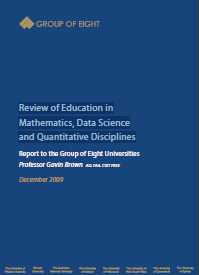|
|
|
|
|
|
|
News & Views item - May 2010 |
![]() The Wilful Chronic Disintegration of Australia's Science and Technology
Intellectual Infrastructure. (May 17, 2010)
The Wilful Chronic Disintegration of Australia's Science and Technology
Intellectual Infrastructure. (May 17, 2010)
 A
recent report --
Review of Education in Mathematics, Data Science and Quantitative
Disciplines -- chaired by mathematician and former
vice-chancellor of The University of Sydney Gavin Brown and commissioned by the
Group of Eight universities, found mathematics education in Australia has
deteriorated so much in the past 20 years that standards are now at "dangerously
low" levels.
A
recent report --
Review of Education in Mathematics, Data Science and Quantitative
Disciplines -- chaired by mathematician and former
vice-chancellor of The University of Sydney Gavin Brown and commissioned by the
Group of Eight universities, found mathematics education in Australia has
deteriorated so much in the past 20 years that standards are now at "dangerously
low" levels.
So far the limited measures, such as halving HECS fees for maths and science graduates, has done little to stem the decline. Indeed if there is an education revolution taking place it certainly hasn't reached the teaching of mathematics or statistics, if anything the sector is declining and has been for the past 20 years. Put simply because of: "A chronic shortage of qualified maths teachers and limited graduates entering the profession, there's simply not enough new blood coming through to replace older teachers as they retire [thereby leading] to serious skills shortages in areas such as mining, finance, engineering and statistics, with the CSIRO and the Australian Bureau of Statistics expressing 'grave' concern about their ability to recruit graduates."
The matter of the chronic disintegration of maths and stats in Australia's tertiary, secondary, and primary educational sectors has been brought before the Australian population and its political representatives time and time again. As The Age's Elisabeth Tarica wrote recently: "Three years ago, 500 of the world's top academics took the unusual step of signing an open letter to then prime minister John Howard to highlight the perilous path in Australia's maths capability." Today, neither the Rudd government nor the Abbott led opposition pays it even lip service.
 Australia's
sole Fields Medallist, UCLA based Terry Tao says Australia will continue to lose
its brightest and best unless governments show more support for reviving maths:
"Some of the key problems are a shortage of mathematically qualified teachers at
the high school level, and a reduction in the outreach and teacher training
programs that have traditionally been provided by maths departments at
universities. There also does not appear to be a full awareness of the career
opportunities available to mathematically literate graduate or, conversely, the
large range of career options that become limited if one does not have a
sufficient background in maths, stats, or quantitative reasoning."
Australia's
sole Fields Medallist, UCLA based Terry Tao says Australia will continue to lose
its brightest and best unless governments show more support for reviving maths:
"Some of the key problems are a shortage of mathematically qualified teachers at
the high school level, and a reduction in the outreach and teacher training
programs that have traditionally been provided by maths departments at
universities. There also does not appear to be a full awareness of the career
opportunities available to mathematically literate graduate or, conversely, the
large range of career options that become limited if one does not have a
sufficient background in maths, stats, or quantitative reasoning."
And Professor Geoff Prince, director of the Australian Mathematical Sciences Institute puts it this way: "Maths really has an identity problem, as most students and parents in year 10 have no clue what careers are available for people in maths . . . companies don't call their mathematicians that, they are usually called the financial analysts or other things." He also make the point that Australian can no longer ignore the state of mathematical sciences. Once a leader in maths, it now lags behind England and the US and is heavily outperformed by most Asian countries.
University of Melbourne's Professor Hyam Rubinstein told Ms Tarica that half of Australian universities no longer offer an undergraduate major in statistics. "They shouldn't call themselves universities any more as far as I'm concerned; that is disgraceful," and notes that demand for mathematics and statistics graduates is expected to grow in Australia by 3.5% a year until 2013.
And yet in the UK, the number of applicants to maths degrees increased by two-thirds, in Australia the number of mathematics major enrolments fell by about 15%.